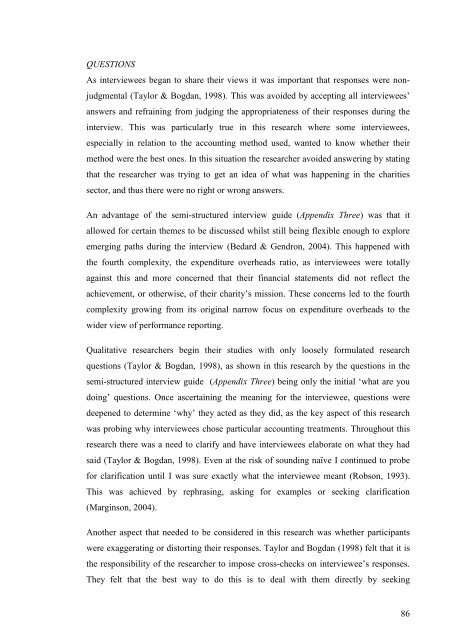Understandability and Transparency of the Financial Statements of ...
Understandability and Transparency of the Financial Statements of ...
Understandability and Transparency of the Financial Statements of ...
Create successful ePaper yourself
Turn your PDF publications into a flip-book with our unique Google optimized e-Paper software.
QUESTIONS<br />
As interviewees began to share <strong>the</strong>ir views it was important that responses were non-<br />
judgmental (Taylor & Bogdan, 1998). This was avoided by accepting all interviewees‟<br />
answers <strong>and</strong> refraining from judging <strong>the</strong> appropriateness <strong>of</strong> <strong>the</strong>ir responses during <strong>the</strong><br />
interview. This was particularly true in this research where some interviewees,<br />
especially in relation to <strong>the</strong> accounting method used, wanted to know whe<strong>the</strong>r <strong>the</strong>ir<br />
method were <strong>the</strong> best ones. In this situation <strong>the</strong> researcher avoided answering by stating<br />
that <strong>the</strong> researcher was trying to get an idea <strong>of</strong> what was happening in <strong>the</strong> charities<br />
sector, <strong>and</strong> thus <strong>the</strong>re were no right or wrong answers.<br />
An advantage <strong>of</strong> <strong>the</strong> semi-structured interview guide (Appendix Three) was that it<br />
allowed for certain <strong>the</strong>mes to be discussed whilst still being flexible enough to explore<br />
emerging paths during <strong>the</strong> interview (Bedard & Gendron, 2004). This happened with<br />
<strong>the</strong> fourth complexity, <strong>the</strong> expenditure overheads ratio, as interviewees were totally<br />
against this <strong>and</strong> more concerned that <strong>the</strong>ir financial statements did not reflect <strong>the</strong><br />
achievement, or o<strong>the</strong>rwise, <strong>of</strong> <strong>the</strong>ir charity‟s mission. These concerns led to <strong>the</strong> fourth<br />
complexity growing from its original narrow focus on expenditure overheads to <strong>the</strong><br />
wider view <strong>of</strong> performance reporting.<br />
Qualitative researchers begin <strong>the</strong>ir studies with only loosely formulated research<br />
questions (Taylor & Bogdan, 1998), as shown in this research by <strong>the</strong> questions in <strong>the</strong><br />
semi-structured interview guide (Appendix Three) being only <strong>the</strong> initial „what are you<br />
doing‟ questions. Once ascertaining <strong>the</strong> meaning for <strong>the</strong> interviewee, questions were<br />
deepened to determine „why‟ <strong>the</strong>y acted as <strong>the</strong>y did, as <strong>the</strong> key aspect <strong>of</strong> this research<br />
was probing why interviewees chose particular accounting treatments. Throughout this<br />
research <strong>the</strong>re was a need to clarify <strong>and</strong> have interviewees elaborate on what <strong>the</strong>y had<br />
said (Taylor & Bogdan, 1998). Even at <strong>the</strong> risk <strong>of</strong> sounding naïve I continued to probe<br />
for clarification until I was sure exactly what <strong>the</strong> interviewee meant (Robson, 1993).<br />
This was achieved by rephrasing, asking for examples or seeking clarification<br />
(Marginson, 2004).<br />
Ano<strong>the</strong>r aspect that needed to be considered in this research was whe<strong>the</strong>r participants<br />
were exaggerating or distorting <strong>the</strong>ir responses. Taylor <strong>and</strong> Bogdan (1998) felt that it is<br />
<strong>the</strong> responsibility <strong>of</strong> <strong>the</strong> researcher to impose cross-checks on interviewee‟s responses.<br />
They felt that <strong>the</strong> best way to do this is to deal with <strong>the</strong>m directly by seeking<br />
86

















